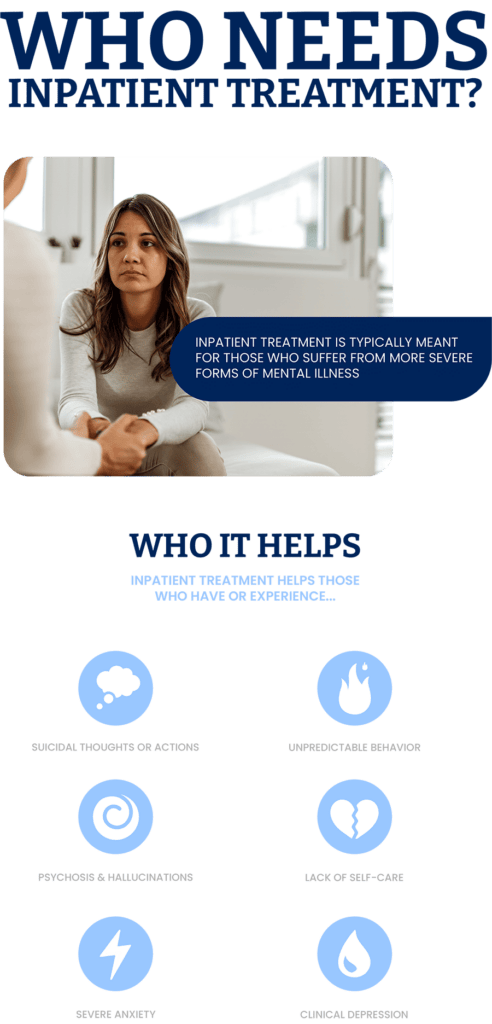Inpatient Treatment Facilities for Mental Health in Los Angeles, California
There is extensive evidence showing that mental and behavioral health, share key risk factors. Mental health conditions are chronic diseases, and therefore, it is of utmost importance that they are treated as such. Montare Behavioral Health in Los Angeles, California offers inpatient mental health treatment facilities with dedicated staff who understand the complexities of treating these conditions.
Mental illness takes control over all aspects of one’s life, including relationships, school, job, etc. Truth is, mental illness is sometimes left undetected or undiagnosed because symptoms do not always appear right away, which makes symptoms significantly worse, and the condition harder to treat. If left untreated or treated improperly, serious consequences will arise.
For people, having these conditions induces a sense of hopelessness and feelings of failure, as well as shame and guilt. For these reasons, this causes many people with co-occurring disorders to suffer in silence or deters them from accessing the help and professional health care necessary to recover because they are afraid of feeling judged.
Truth is, help is available, and you are not alone! The mental health specialists at Montare Behavioral Health in Los Angeles, California can help you or a loved one recover through our inpatient program which specializes in dual diagnosis treatment.
What is Mental Health?
Mental health is arguably the most important aspect of a person’s overall health and well-being. Poor mental health truly affects all aspects, mentally, physically, and socially. The most common mental disorders include:
According to the National Alliance on Mental Illness (NAMI), approximately 3.5 million people (50 percent) in the United States are receiving no treatment for severe mental disorders such as the ones above. In 2018, 9.2 million adults within the United States experienced a co-occurring disorder.
Importance of Mental Health Treatment
It is extremely important to note, that when someone is suffering with mental illness such as depression, they often socially isolate or exhibit other behaviors and mood swings, as a means to cope with the symptoms of their condition.
For example, a person with depression can also suffer from bipolar disorder, or other underlying issues, which is why co-occurring disorders are often overlooked or left undiagnosed.
Despite the consequences both physically and psychologically, people keep using, and little do they know, underlying conditions makes mental illness harder to diagnose, manage, and treat.
Research in a study conducted in a survey on health proved that there are approximately 7.9 million people in the United States suffering from co-occurring disorders. Unfortunately some, do not receive the treatment they need before it is too late. Signs and symptoms of mental illness include:
- Loss of motivation and energy
- Extreme changes in appetite
- Loss of focus- not being able to complete everyday tasks normally
- Neglecting or loss of interest in favorite personal or professional activities and responsibilities
- Denial to get help
- Justifying drinking excessively
- Isolating yourself from loved ones (Friends and family)
- Extreme changes in mood
- Becoming increasingly Irritable, angry, and anxious
Due to the brain’s reward region being repeatedly stimulated by engaging in high-reward activities, this creates a compelling incentive to repeat these activities despite the harmful physical and psychological complications that often result.
In other words, problematic behaviors are common amongst people because they believe that it masks their pain, and reduces or eliminates symptoms of depression, anxiety, etc. Therefore, inpatient mental health treatment such as Montare Behavioral Health in Los Angeles, CA is needed to help those with mental illness properly and safely manage their condition.

Types of Mental Health Treatment
For individuals with severe mental health issues, inpatient treatment also known as residential treatment is one of the main types of treatment for dual diagnosis here in California. People who are chosen to undergo inpatient treatment live at the facility and receive 24/7 treatment. Common methods of treatment in a residential facility include counseling and behavioral therapy, and medication management.
Inpatient Treatment in Los Angeles, California for Mental Health
Inpatient treatment in Los Angeles California is especially beneficial for those who are living with mental health issues. As mental health is very prevalent, the demand for treatment has increased. Inpatient care refers to being admitted into a residential facility within the mental health section to be treated.
The purpose of an inpatient treatment facility for mental health is drastically different from how it was way back when. Psychiatric hospitals used to exist solely to lock away people with mental illness away from the rest of society that was perceived to be “normal.”








Inpatient Mental Health Services in Los Angeles, California
The main goal is for people to recover so they can function, and most importantly, create a successful and independent life. There are various mental health services at our Los Angeles residential facility that help to reduce suffering and optimize mental health. These include:
- Individual and group therapy
- Medication management
- Coping and life skills for managing mental illness
Who Needs an Inpatient Mental Health Facility?
Sometimes conventional help such as medication and various types of counseling and therapy is unfortunately not enough to assist someone with mental illness. Thankfully, our Los Angeles mental health inpatient facilities can provide the right form of treatment that can help a person long-term. Residential treatment facilities primarily are best for the following types of people, but are not limited to:
- People who have thoughts, moods, feelings, and behaviors that are out of control
- A danger to themselves or others
- Suicidal people
- Experiencing psychosis such as hallucinations or delusions
- Failure to engage in self-care
- People with severe anxiety and clinical depression
- Experiencing increased mental health problems despite outpatient treatment
Purpose of Inpatient Mental Health Treatment
Today, inpatient mental health treatment programs exist to not only treat people with existing mental health problems but also give them the proper resources to manage and cope with their conditions, so that they can properly thrive in society. These facilities exist to help enhance an individual’s mental health in a safe and controlled environment.
Inpatient mental health facilities were established to meet the high demand of people needing treatment for mental illness. The goal and purpose of our inpatient mental health treatment is to help people restore their wellness and stabilize their condition and symptoms.
Once stable, each person will work with medical professionals and mental health specialists after receiving a comprehensive treatment plan tailored specifically towards their recovery needs and goals, so they can live the healthy lifestyle that they deserve.
Benefits of Inpatient Mental Health Treatment in Los Angeles
- Reducing and controlling negative thoughts, by stabilizing moods, thoughts, emotions, and behaviors
- Determine risk factors such as a family history of mental illness, and other underlying issues that could be contributing to the development of these conditions
- Determine the best method of medication and treatment
- Identify a network of social support during recovery and after
- Teach coping and life skills and techniques for during and after treatment
A mental health treatment plan has to be regimented to help people with mental illness receive the inpatient treatment that most effectively helps them meet their needs, achieves their goals, and most importantly, helps them become healthy, mentally and physically.
At Montare Behavioral Health in Los Angeles, our multidisciplinary team, comprised of mental health specialists, mental health professionals, psychiatrists, psychologists, behavioral health technicians, and specialists, believe in treating the mind, body, and spirit. Treating patients as a whole will allow comprehensive treatment to be successful, and underlying factors such as mental health will not be overlooked.
Erase the Stigma of Mental Illness
Stigma often surrounds mental illness. Even though we know people suffering from a mental disorder such as anxiety and depression, it is still hard to comprehend it fully unless you are standing in their shoes. That is why oftentimes, we don’t know how to properly help someone, as the proper resources lie in the hands of professionals.
People suffering from mental illness often act in unusual ways, which can make others around them feel uncomfortable. This offsets a chain reaction of feeling uncomfortable then results in a person treating another individual differently, discriminating against them in a sense consciously or unconsciously because they feel uncomfortable.
Truth is, today, we still struggle to change the narrative surrounding mental health treatment. Negative stigmas still plague and deffer people from receiving the treatment that they truly need because of embarrassment or shame.
450 million people worldwide are suffering from mental health issues. In addition, only a small percentage enter treatment. However, today, more and more people are learning how important it is to seek out help. Even as we slowly begin to break down these barriers, dual diagnosis treatment is still confusing to many.
Begin Treatment at Our Inpatient Mental Health Facilities in Los Angeles, California
At Montare Behavioral Health, we are educating people that mental health is not something to be ashamed of, and recovery is possible. Contact us today to learn more about our inpatient mental health treatment programs in Los Angeles, California. To learn more about our admissions process, click here. Sobriety is right around the corner!




